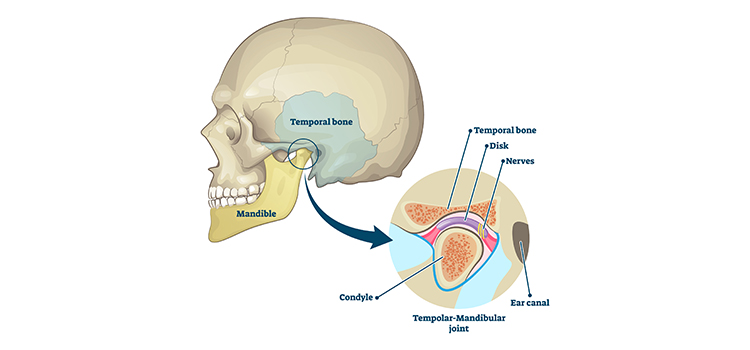Temporomandibular Joint Disorder (TMD) is caused by the improper function of your Temporomandibular Joint which is referred to as TMJ. Your TMJ is the joint that connects your jaw to your skull and acts like a hinge when you open and close your mouth.
February 25, 2021
Therefore, it plays a major role in how you conduct everyday functions such as talking, eating, and drinking. The TMJ muscles are responsible for how your mouth moves from side to side.


Whilst moving your jaw, you also use muscles that help to move your head and neck. As a result, patients who suffer some TMD may display symptoms such as headaches or neck pain.
If you experience pain or discomfort coming from your TMJ, you may have TMJ disorder. The pain generally comes from your jaw or the muscles which support your jaw.
There are many factors that may cause TMD. These include:
TMD could be caused by trauma or impact such as getting hit in the jaw or from over-stretching your mouth too wide during activities such as eating or during long dental procedures.
In addition, arthritis in your joints may also be a contributing factor to developing TMD.
Abnormal habits such as biting your nails, may lead to the development of TMD in some cases. Other abnormal habits include:
In addition, these habits may make it harder to stop the pain in your TMJ due to the movements of these actions.
The improper alignment of your jaw or the way your teeth bite together may also play a role in developing TMD. Although not as common as other causes, in some cases this may be why you experience pain within your TMJ.
For this, your dentist may advise you to undertake an orthodontic treatment.
Research suggests that emotions such as stress and anxiety may be a contributing factor to TMD (1). Emotions, such as stress, are our body’s way of reacting to tough situations.
Stress is known to present symptoms such as:
Therefore, with increased stress levels you may enhance the effects of Temporomandibular Joint Disorder.
Furthermore, other physical factors such as poor posture may also contribute to TMD.


Depending on your case, you may feel symptoms or effects throughout different parts of your body such as your:
You may experience some pain or ringing in your ear. It is also common to feel dizzy or experience vertigo.
In some cases, you may have some pain behind your eye, develop blood shot eyes or your eyes may become sensitive to light.
Temporomandibular Joint Disorder might prompt your jaw to make a slight clicking or popping sound within your jaw joints. As a result, you can experience pain in your cheek and restrict you from opening and closing your mouth like normal.
You may be prone to clenching or grinding your teeth at night while you sleep. This may also lead to your back teeth to become loose or sore.
Headaches and migraines are a common symptom of TMJ and you may wish to consult with your dentist or health professional for the appropriate pain relief.
If you suffer from TMJ disorder, you may also have restricted mobility within your neck and experience some level of stiffness.
Because there are so many possible causes of TMD, there is no “quick fix” or “cure.” Your TMD symptoms may be temporary and self-limited without serious long-term effects.
Most researchers recommend that you should first focus on conservative and reversible therapies. Research has shown that self-management and conservative treatments are the most successful.
The goals of treatment are to decrease pain, to increase jaw function, and to limit the impact of TMD on your daily life. TMD is managed like other joint and muscle problems in the body.
Dr Tony Simeone believes in a multidisciplinary approach to help treat TMJ. Many of our patients display symptoms of TMD from different areas of the body.
For example, a previous injury that is distant from your TMJ but is identified as a potential cause may require the care from another health professional.
To ensure our patients receive the best care, depending on your case, your treatment may also involve the use of a:
Other treatment options may include:
Our conservative jaw positioning therapy is designed to allow the body an opportunity to heal itself.
Through use of clinical assessment along with specialized imaging to show the relationship between the jaw and the skull, we are able to minimize the trauma (injury/irritation) to the jaw joints and maximize the healing effects through proper positioning of the Temporomandibular Joint (s).
The proper positioning of this joint (s), using orthotic appliances, is imperative in the healing process.
Physical therapy and protection of the jaw during healing including exercise, a healthy diet plan with vitamins and mineral supplements go hand in hand to maximize repair of the damaged tissues.
Non-invasive therapies such as physiotherapy, chiropractic, massage, ultra-sound, iontophoresis, infrared, radiofrequency, trigger point or low level laser therapy may be recommended for optimum healing. Regular use of our Floatation Tank and infrared sauna may also be necessary to reduce inflammation and relax muscles to speed healing.
Depending on the level of pain, your doctor may advise you to help treat TMD with some pain relief medication to help ease the pain.
You should consult with your doctor to determine the best course of action for your condition.
If you suffer from Temporomandibular Joint Disorder or are displaying any symptoms, contact our friendly team today.
Dr Tony Simeone will be able to assess your condition and develop a customised treatment plan to help restore your TMJ.
For more information, you can visit our TMJ Disorders and Pain Therapy page.
If you would like to get your TMJ assessed, you can book an appointment online 24/7.